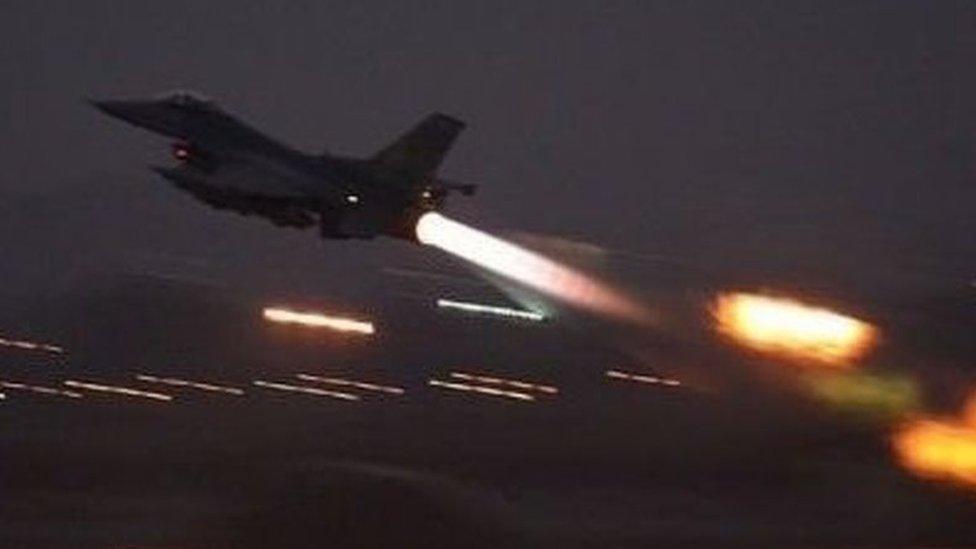'They call us garbage people': The Syrians surviving off US army waste
- Published
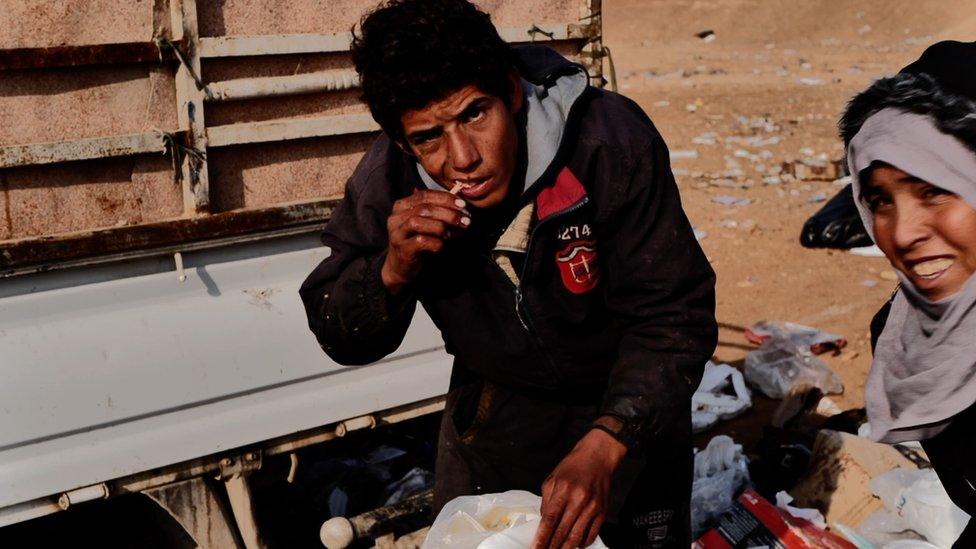
It is no life for any child scavenging in a rubbish dump
Amid piles of waste, and surrounded by toxic fumes from burning rubbish, a small group of people hunt for food to eat and plastic to sell for recycling.
This is not the life Alia wanted for her children.
For the past three years, she has set off at 07:00 every day on a two-hour journey to the dump in Tell Beydar, north-east Syria, often taking Walaa with her.
Alia's eldest daughter, born when Alia was barely in her teens, stays at home to take care of a younger child.
Alia and Walaa do not return until sundown. By this time, the family is starving.
"I have always dreamt that my daughters would study like other girls," Alia says.
"But now they are like me, they don't know how to read or write at all."
The US military dump, though, is their only source of food and income.
"People shame us; they call us garbage people," says 25-year-old Alia.
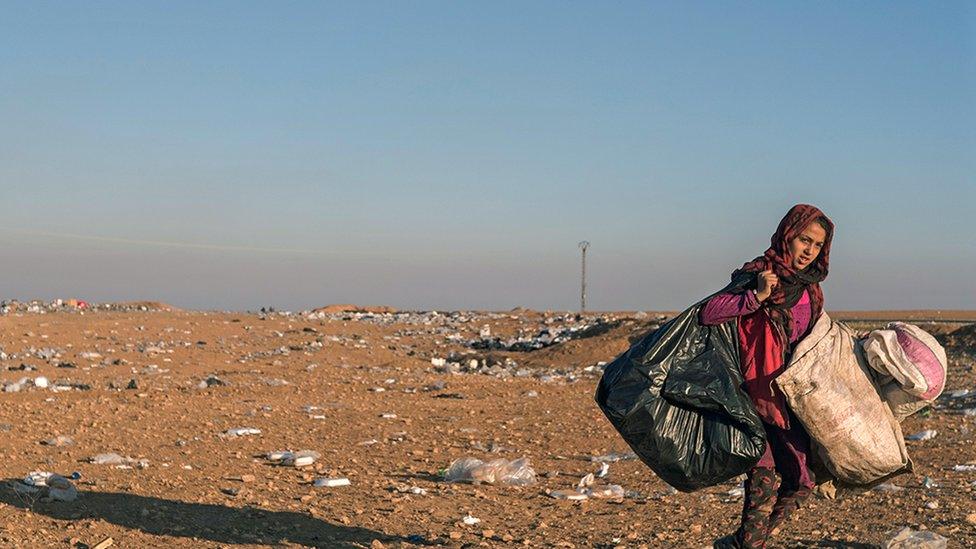
Walaa is weighed down by rubbish
After more than a decade of war, an estimated 15.3 million people are in need of humanitarian assistance, the latest UN figures show. And four in five people out of this total do not have access to sufficient food.
Alia's daughter Walaa is one of them.
"We're here to find meat, to find food because we're hungry," says the 12-year-old.
In the Kurdish-controlled north-east, the war against the jihadist group Islamic State (IS) has devastated the local economy.
Alia's husband was a farm labourer. But when he died 10 years ago, the family unit collapsed.
A raging war, worsening drought and dire economic conditions have made her desperate.


A truck arrives at the dump and the children rush forward.
Rummaging through piles of black rubbish bags, 15-year-old Amer finds leftover pieces of chicken.
He sucks on the bones and hunts for more.
"If there were other jobs, I would have worked elsewhere. But there's nothing else for me to do," he says.
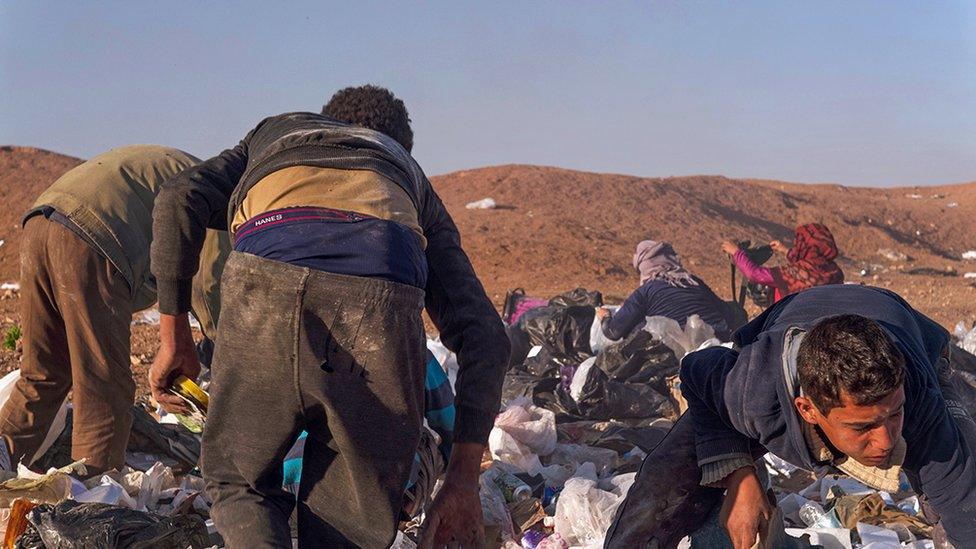
Children can walk for up to two hours to reach this dump
Amer is the only breadwinner in his family of 11.
He earns between 3,000 and 5,000 Syrian pounds (roughly $1-2; £0.80-1.60) a day from selling the plastic he finds. It's barely enough to survive.
"Things got hard after the war. We can't even afford bread," he says.
Amer's brother fought alongside American forces against IS in the region.
He was recently injured on patrol and barely makes enough money to provide for his family.
"The Americans should do more to help us," adds Amer.
The fight against IS
In 2015, the US deployed troops in Syria to support the Kurdish-led Syrian Democratic Forces (SDF) militia alliance in their fight against IS. Four years later, they declared victory over the jihadist group in Syria.
The area is now governed by a Kurdish-led multi-ethnic administration, but life is far from normal.
"What is happening in the north-east is a natural outcome of the deteriorating conditions in the country," says the head of a non-governmental organisation working on development projects in the region, who wishes to remain anonymous for security reasons.
The north-east's vast agricultural lands and oil fields were once a main source of income for Syria.
Now, skyrocketing food prices, rising security threats, and a doubling in population caused by the arrival of hundreds of thousands of displaced people have increased poverty rates.
Many people are now reliant on humanitarian aid to survive, but scarce funding and logistical constraints mean aid is not reaching everyone in need.
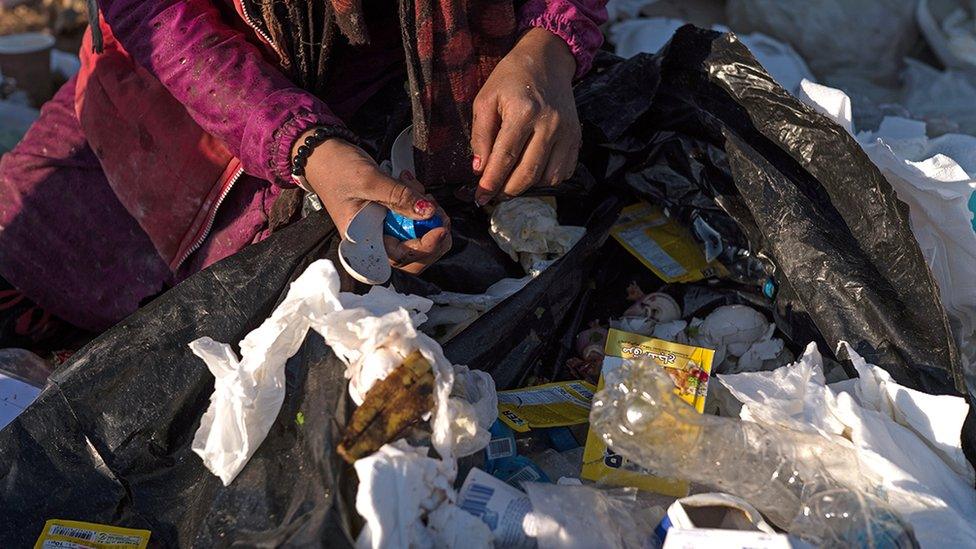
Walaa sifts through piles of rubbish
The UN has been struggling to get aid into the area, especially after Russia and China blocked a UN resolution authorising continued deliveries via an Iraqi border crossing in 2020. That meant people living in the north-east had to start relying on shipments via Syrian government-controlled territory.
Even the aid that does arrive is mostly sent to camps for displaced people and areas most affected by the war, such as Raqqa and Deir al-Zour, the head of the NGO explains.
Rural areas in between, such as the villages around Tell Baydar and others, are overlooked.
Journalist Hamza Hamki, from the city of Qamishli, says "dumpster diving" is not widespread across the north-east but that the number of people resorting to it has increased.
"People need development projects. They need reconstruction. But these projects don't exist, which contributes to rising poverty rates."
Constant security threats hinder any plans to fund such projects. Turkey launched in 2019 a military offensive to drive out SDF forces from a stretch of territory along the Syrian border west of Tell Baydar, and it has said recently that it is planning another such operation.
The SDF is dominated by the Kurdish People's Protection Units (YPG), which Ankara lists as a terrorist organisation. It sees the YPG as an extension of the Kurdistan Workers' Party (PKK), which has fought for Kurdish autonomy in Turkey for decades, and says the militia's presence in border areas constitutes a security threat.
There is also the risk of an IS resurgence.
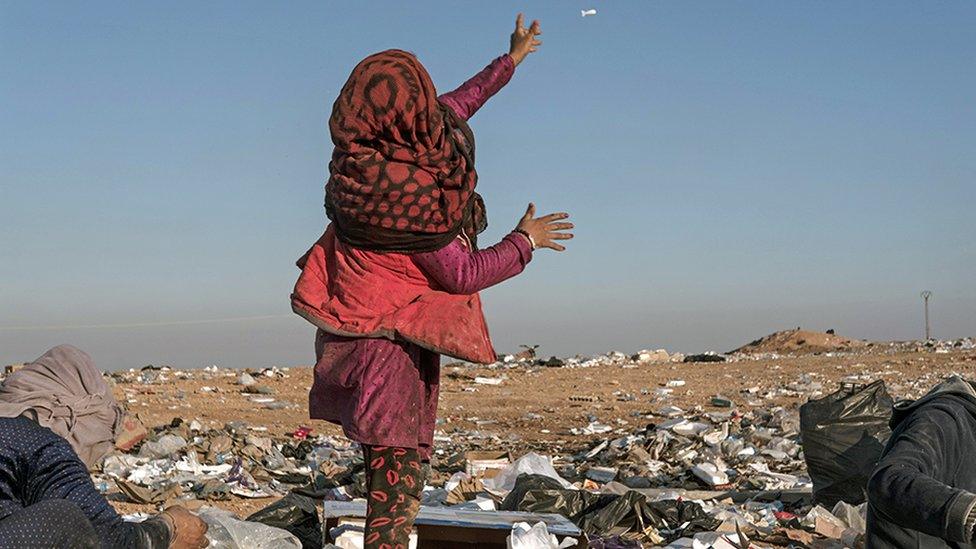
A US surveillance blimp hovers overhead as Walaa rummages through the dump
The presence of about 900 US troops in Syria offers protection against these threats. But it is not yet clear how long the US bases there will remain operational.
"If the US pulls out, it will take no more than 24 hours for the entire region to fall to either Turkey or the Syrian government," says Mr Hamki, adding that both scenarios would have "catastrophic" implications on people in the area.
"People do not have issues with any side. People just want to live with dignity," he says.
Children like Amer and Walaa have spent their whole life knowing nothing but war and desperation.
"I wish we had a bit more money so I could go to school and work [somewhere else]. That's all I wish for," says Amer.
Related topics
- Published7 December 2022
- Published25 November 2022
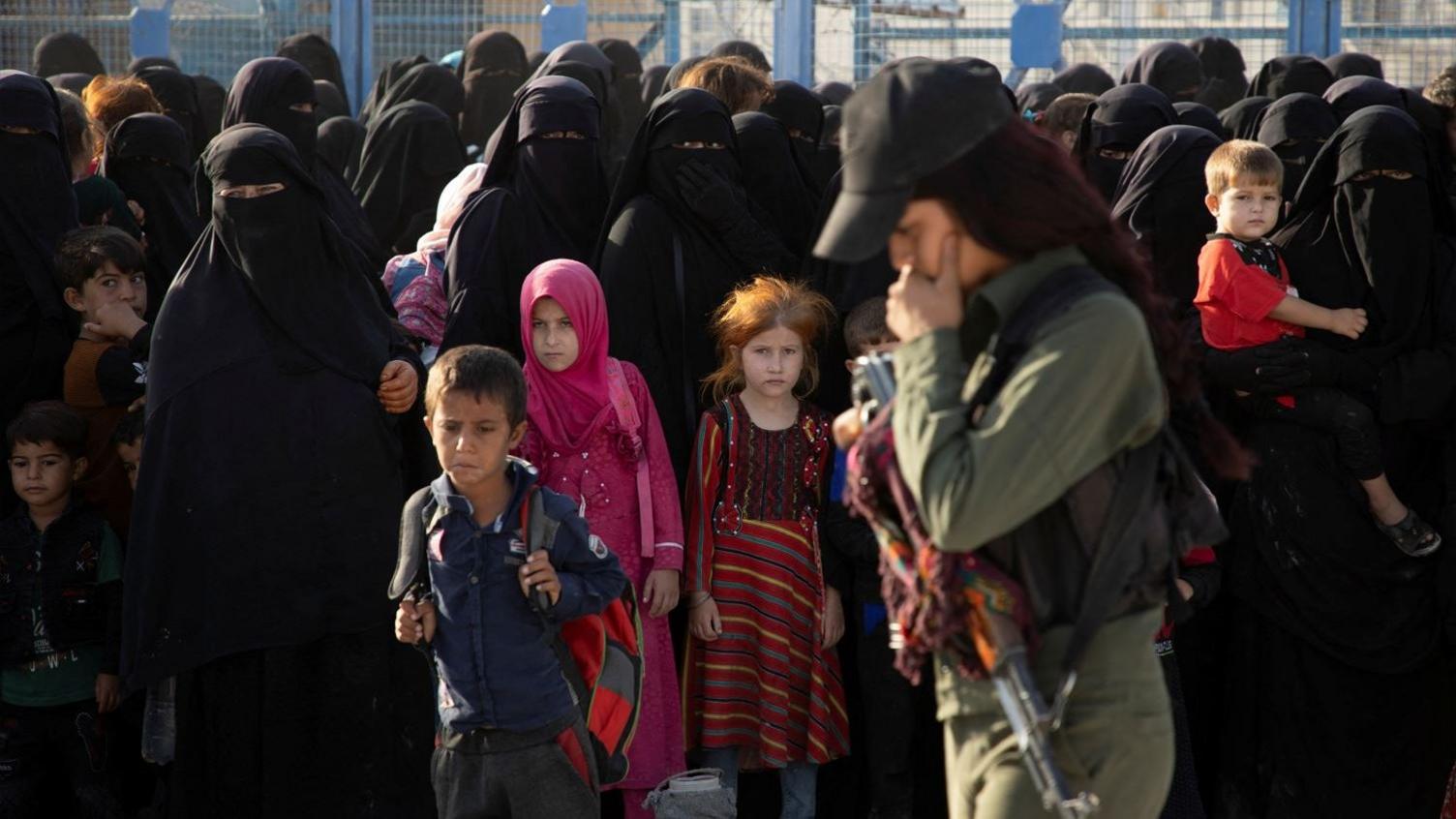
- Published23 November 2022
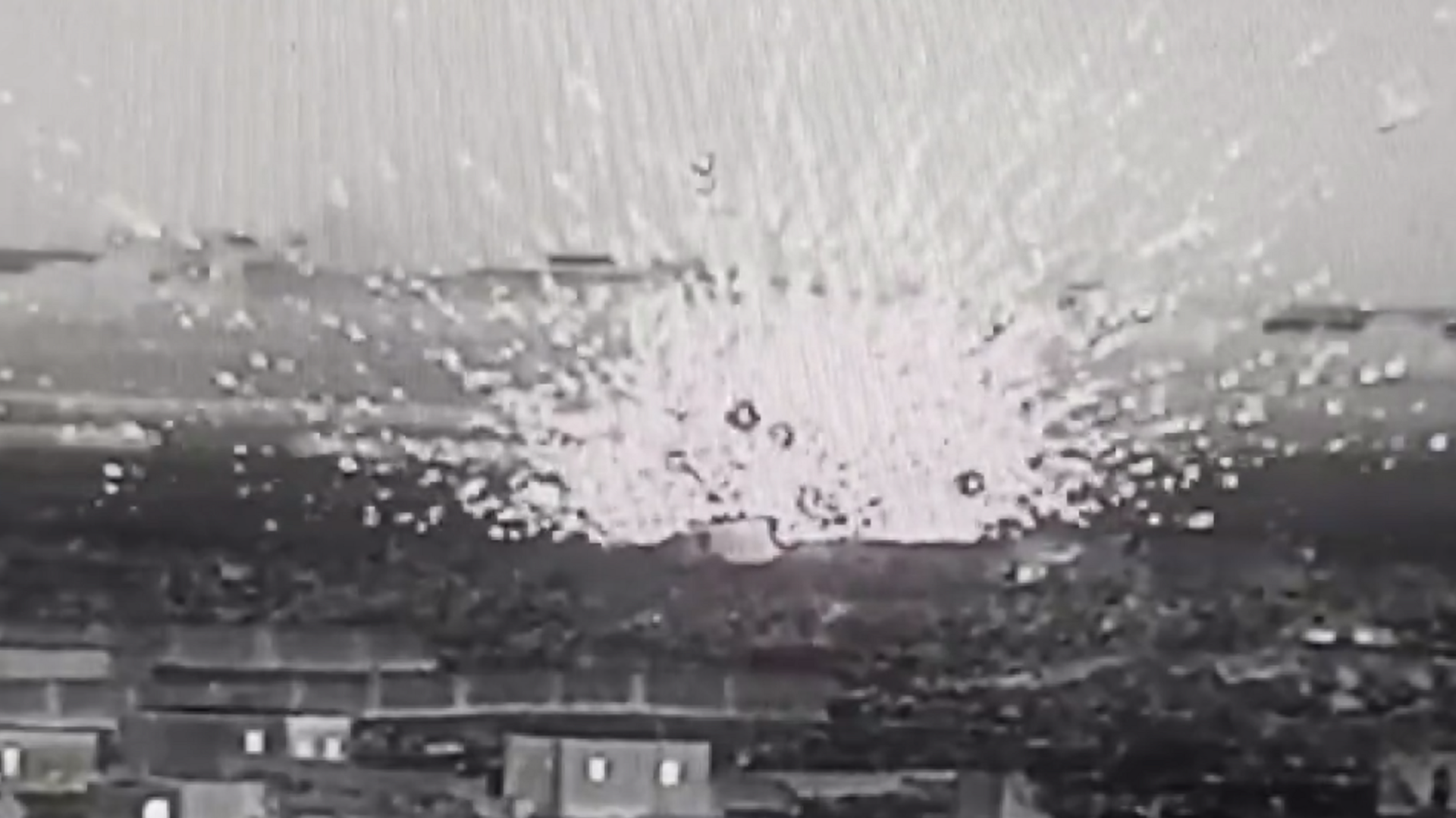
- Published20 November 2022
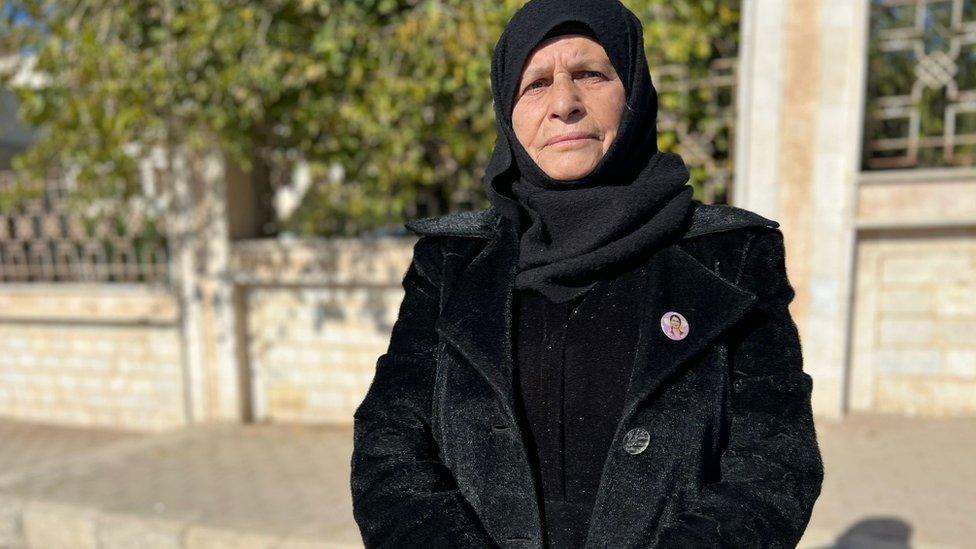
- Published20 November 2022
